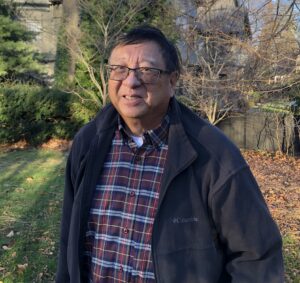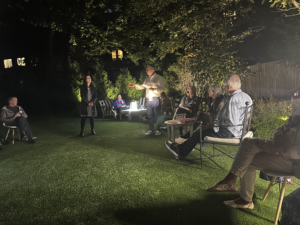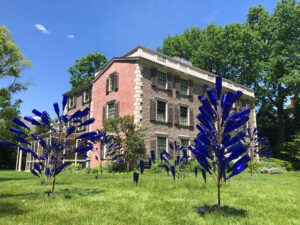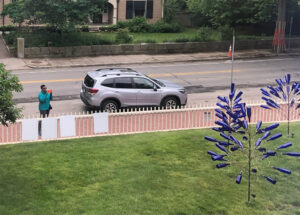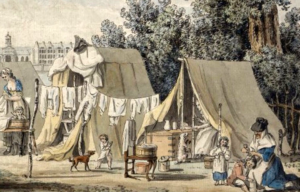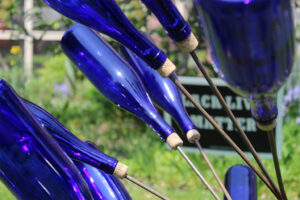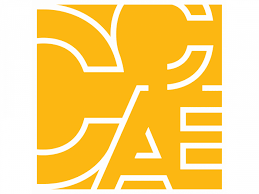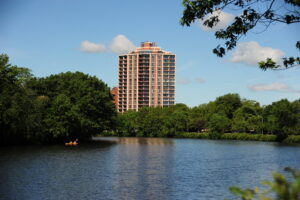Posts Tagged ‘West Cambridge’
Stephen T. Chen
Stephen Chen was born in Cambridge to Thomas and Joyce Chen in 1952. In his interview, Stephen talks about what it was like growing up in West Cambridge on Alpine Street. He describes how his mother, Joyce Chen, thrived as a restauranteur and entrepreneur through her cooking show, restaurants, and inventions. Audio coming soon!
Read MoreSeptember 28 Event Recap: Hidden Huron Village
Save the date for September 28, 2023 — Hidden Huron Village: A Fundraiser for History Cambridge!
Read MoreThe Window Shop
Compiled by Deb Mandel, 2022 Years 1939 – 1972 Locations 37 Church St. (May 2, 1939-Nov. 1939) 102 Mt. Auburn St. (Nov. 1939-1947) 56 Brattle St. (1947-1972) History A small group of philanthropic-minded Cambridge women opened The Window Shop on the second floor of 37 Church St. in Harvard Square in 1939. One of these women…
Read MoreForgotten Souls of Tory Row: Remembering the Enslaved People of Brattle Street
All are welcome to view the striking art installation on the front lawn of the Hooper-Lee-Nichols House from dawn to dusk. Only a few days left to see the exhibit before it comes down on April 7.
Read MoreHistory Cambridge plans a celebration Saturday for its ‘Forgotten Souls of Tory Row’ installation
History Cambridge put out a call in February to artists to create a temporary installation on the lawn of our headquarters, the Hooper-Lee-Nichols House, 159 Brattle St., West Cambridge. With support from Cambridge Arts and the Mass Cultural Council, this project’s goal was to honor the enslaved people who lived and worked on Brattle Street. Many of the area’s wealthy homeowners made their wealth through enslaved labor in Jamaica and enslaved people at their homes and estates in Cambridge. Joseph and Rebecca Lee, owners of the Hooper-Lee-Nichols House, were complicit in this economy. We know of at least five individuals – Cesar, Prince, Caesar, Mark Lee (or Lewis) and a woman whose name we do not know – who were enslaved by the owners of the house. Although we have no direct surviving evidence that an enslaved person ever lived there, we know other white Tory Row families enslaved people at their Brattle Street mansions. History Cambridge strives to use its headquarters in a way that recovers and shares the stories of the enslaved people of this land and acknowledges that chattel slavery was a Northern as well as a Southern system.
Read MoreSelf-Guided Tour: The Work of Revolution in Cambridge
Introduction For many, the first image that comes to mind when thinking of Cambridge during the Revolutionary Era is that of General George Washington taking command of the Continental Army on Cambridge Common in July of 1775, under what would come to be known as the Washington Elm. Although we now know that this tale…
Read MoreCambridge’s Caribbean connection runs deep
“Forgotten Souls of Tory Row: Remembering the Enslaved People of Brattle Street,” the installation of bottle trees now on view at the History Cambridge headquarters (159 Brattle St.), was inspired by a custom that originated in Congo in West Africa long ago. The tradition of bottle trees was brought to the Caribbean and the Southern United States by enslaved people and passed down through generations. While bottle trees signify different things to different people, there is agreement that the bottles are placed on tree branches to destroy evil spirits and to capture the energy, spirit and memories of ancestors.
Read More‘Forgotten Souls of Tory Row’ art installation remembers enslaved people of Brattle Street
Cambridge and slavery are not often paired in the public imagination. Most think of the enslavement of people of African descent as a Southern phenomenon from which the North, particularly New England, was exempt. But slavery was a very real, ever-present institution in Northern colonies and, later, states – including Massachusetts. Recent efforts by academic and public historians to emphasize the role slavery played in the Cambridge area include the re-centering of Medford’s Royall House and Slave Quarters to focus on the experiences of enslaved people on that estate, as well as Harvard University’s recent release of the “Harvard and the Legacy of Slavery” report. History Cambridge has also been engaged in this important work through our research and public programs, including our Tory Row Antiracism Coalition
Read MoreCambridge Center for Adult Education
Cambridge Center for Adult Education is a non-profit organization providing a wide range of high-quality, low-cost educational experiences in Cambridge, Boston, and surrounding area since 1870. Contact CCAE via email or at 617-547-6789
Read MoreA Brief History of “Ten Ten”
By Elizabeth af Jochnick Before Ten Ten was Ten Ten, it was an in-patient infirmary for Harvard students, located next to Mount Auburn Hospital, known as the Stillman Infirmatory. When the University moved its student health facilities to Harvard Square, they put the Infirmary up for sale. Harvard offered to sell the building and the…
Read More
